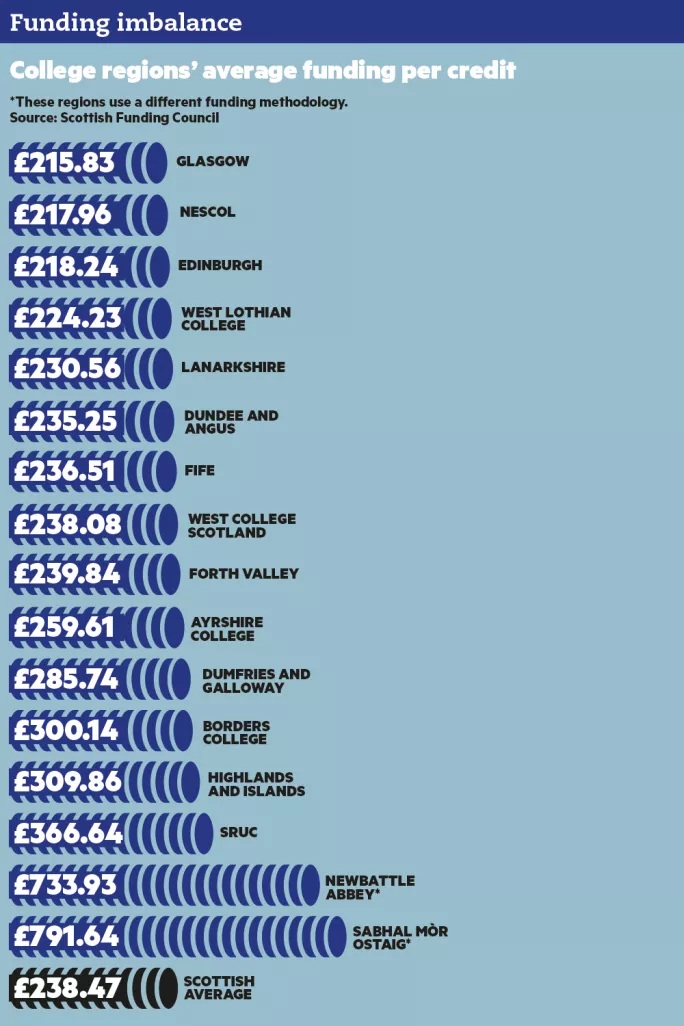Give credit where credit is due, colleges tell SFC

Huge regional variations in the amount of cash given to Scottish colleges have been revealed by a TESS analysis, sparking calls for a new funding system to be fully rolled out.
Since 2015-16, funding has been calculated according to a system based on credits. But the average amount that colleges receive per credit varies from £216 to £367, according to Scottish Funding Council (SFC) data.
The Glasgow college region has the lowest rate of nearly £216, while Borders College, SRUC and colleges in the Highlands and Islands region all receive more than £300.
Newbattle Abbey College and Sabhal Mòr Ostaig receive more than twice that amount, but are not funded in the same way as other colleges.
The SFC stressed that, in distributing the funding, it took into consideration factors such as the variations in the cost of provision - with some courses simply being more expensive to run than others - and the social and geographical context of the college.
Because of this, some colleges receive much less than they would if their funding per credit was at the Scottish average.
However, while it is generally accepted that there will be regional funding differences resulting from varying costs, critics argue that the disparities are too great. And some colleges claim that the allocations do not always adequately reflect current provision.
If Glasgow, the region with the lowest average funding, received £22 more per credit (bringing it up to the Scottish average), its allocation would increase by more than £8 million annually.
‘Disappointing’ allocation
A spokeswoman for Glasgow Kelvin College acknowledged that different costs needed to be considered when meeting the needs of communities throughout Scotland. But she added that the “college is disappointed that the value of the credit is not closer to the national average”, given the deprivation challenges faced by Glaswegians.
Glasgow Clyde College had been “working hard” to increase the level of funding coming into the region, a spokeswoman said.
“We would hope that with the implementation of the new simplified funding methodology, greater recognition is given to matching funding to actual delivery and identified need with a resultant increase in allocation for Glasgow region,” she added.
The new methodology was introduced in 2015-16, but the SFC has not set a date for when it will be fully up and running.
A spokesman for the Glasgow Colleges’ Regional Board said that the three colleges in the city had made significant changes to the curriculum to better meet the economic and social needs of the area.
However, because the SFC had not yet fully brought in its new funding methodology, Glasgow’s allocation did not recognise these changes, he added. “The region has therefore requested that the SFC move fully to the new simplified funding methodology so that funding allocated to each region relates more closely to actual delivery and which would result in an increased allocation for Glasgow.”
‘Transitional phase’
North East Scotland College (NESCol) receives the second lowest average amount per credit at £217.96. This is more than £20 below the Scottish average and significantly less than, for example, Ayrshire College - although both institutions are of a similar size and serve a mix of urban and rural communities.
If NESCol was given the same per-credit funding as Ayrshire, it would receive an additional £5.5 million annually.
NESCol principal Liz McIntyre said that the SFC had told the college that the funding differences were due to the mix of provision offered. But she called for “the rural nature” of the region to be “taken into consideration.”
Shona Struthers chief executive of Colleges Scotland, said that the new funding model was still in a transitional phase. “As you would expect, Colleges Scotland will be following its implementation closely and will be working with colleges and the SFC to enhance the system where required and ensure its success,” she added.
Vonnie Sandlan, president of the NUS Scotland students’ union, said: “These figures highlight the complex nature of college funding, and the difficult decisions colleges need to make on the subjects they deliver and the places available. However, often that’s based on historical provision rather than current need.
“As we’ve seen with the sharp reduction in part-time provision, it’s vital that colleges, the SFC and the government continue to work together to ensure the right provision is on offer where necessary and no student misses out.”

You need a Tes subscription to read this article
Subscribe now to read this article and get other subscriber-only content:
- Unlimited access to all Tes magazine content
- Exclusive subscriber-only stories
- Award-winning email newsletters
Already a subscriber? Log in
You need a subscription to read this article
Subscribe now to read this article and get other subscriber-only content, including:
- Unlimited access to all Tes magazine content
- Exclusive subscriber-only stories
- Award-winning email newsletters